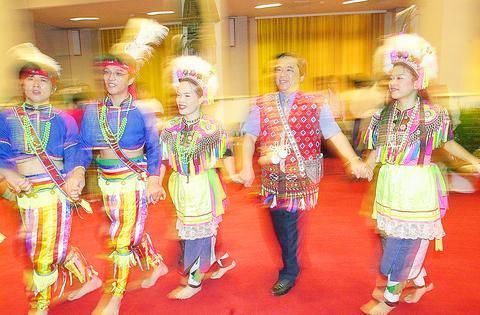The Executive Yuan yesterday passed a draft bill on the establishment of the Aboriginal autonomous region, but Aboriginal lawmakers expressed lukewarm opinions over the government initiative.
According to the statute on the establishment of the Aboriginal autonomous region, each the nation's 11 Aboriginal tribes would be able to set up a tribal council of their own to be in charge of the establishment of their own autonomous region.

PHOTO: CHANG CHIA-MING, TAIPEI TIMES
Different Aboriginal tribes could also jointly set up a single autonomous region and one single tribe could set up more than two or more autonomous regions.
The autonomous region would have its own law, land ownership, political structure, economic system, society and culture.
The central government would be able provide financial assistance to those autonomous regions with financial difficulties.
Should there be any disputes between the regions, the central government and the autonomous region or regions in dispute could ask the Legislative Yuan to mediate.
Autonomous regions having disputes could also turn to the Executive Yuan for intervention.
Praising the draft as an important milestone in the government's respect of a multi-ethnic society, Premier Yu Shyi-kun said that the approval of the draft marks one giant step toward the realization of President Chen Shui-bian's (
On Sept. 10, 1999, Chen signed an agreement with Aboriginal tribes in which he pledged to promote an autonomous region for Aborigines and push for other native rights -- such giving them a say in the use of natural resources, land ownership and the resumption of using the original ethnic names of Aboriginal tribes, rivers and mountains.
Describing the draft as "vague," Aboriginal Legislator May Chin (
"I wouldn't call myself an indigenous person if I supported the draft," she said, adding that she and other independent lawmakers would propose their own version of the bill.
Chin said the Cabinet's approval of the draft was done merely to curry political favor.
"If President Chen really wants to make good on his promise, he should've presented the beef instead of just the menu in which the chef cannot even cook up the order," she said.
Aboriginal Legislator Walis-Pelin (瓦歷斯貝林), convener of the legislature's independent alliance, said that although he recognized the government's efforts to approve such a draft, there is still room for improvement.
"Aborigines should have had the right to self govern themselves long time ago," he said.
"Aborigines might be able to preserve their own cultures, languages and traditions, but the draft fails to specifically regulate such controversial issues as land ownership, resources use," Walis-Pelin said.
He also said that he would not support the Cabinet's version in the legislature.
"In the version of the independent alliance, Aborigines should enjoy a high degree of autonomy and the administrative status of the Aboriginal autonomous region should be on a par with that of the Executive Yuan," he said.

A preclearance service to facilitate entry for people traveling to select airports in Japan would be available from Thursday next week to Feb. 25 at Taiwan Taoyuan International Airport, Taoyuan International Airport Corp (TIAC) said on Tuesday. The service was first made available to Taiwanese travelers throughout the winter vacation of 2024 and during the Lunar New Year holiday. In addition to flights to the Japanese cities of Hakodate, Asahikawa, Akita, Sendai, Niigata, Okayama, Takamatsu, Kumamoto and Kagoshima, the service would be available to travelers to Kobe and Oita. The service can be accessed by passengers of 15 flight routes operated by

Chinese spouse and influencer Guan Guan’s (關關) residency permit has been revoked for repeatedly posting pro-China videos that threaten national security, the National Immigration Agency confirmed today. Guan Guan has said many controversial statements in her videos posted to Douyin (抖音), including “the red flag will soon be painted all over Taiwan” and “Taiwan is an inseparable part of China,” and expressing hope for expedited reunification. The agency last year received multiple reports alleging that Guan Guan had advocated for armed reunification. After verifying the reports, the agency last month issued a notice requiring her to appear and explain her actions. Guan

GIVE AND TAKE: Blood demand continues to rise each year, while fewer young donors are available due to the nation’s falling birthrate, a doctor said Blood donors can redeem points earned from donations to obtain limited edition Formosan black bear travel mugs, the Kaohsiung Blood Center said yesterday, as it announced a goal of stocking 20,000 units of blood prior to the Lunar New Year. The last month of the lunar year is National Blood Donation Month, when local centers seek to stockpile blood for use during the Lunar New Year holiday. The blood demand in southern Taiwan — including Tainan and Kaohsiung, as well as Chiayi, Pingtung, Penghu and Taitung counties — is about 2,000 units per day, the center said. The donation campaign aims to boost

The Central Weather Administration (CWA) said a magnitude 4.9 earthquake that struck off the coast of eastern Taiwan yesterday was an independent event and part of a stress-adjustment process. The earthquake occurred at 4:47pm, with its epicenter at sea about 45.4km south of Yilan County Hall at a depth of 5.9km, the CWA said. The quake's intensity, which gauges the actual effects of a temblor, was highest in several townships in Yilan and neighboring Hualien County, where it measured 4 on Taiwan's seven-tier intensity scale, the CWA said. Lin Po-yu (林柏佑), a division chief at the CWA's Seismological Center, told a news conference